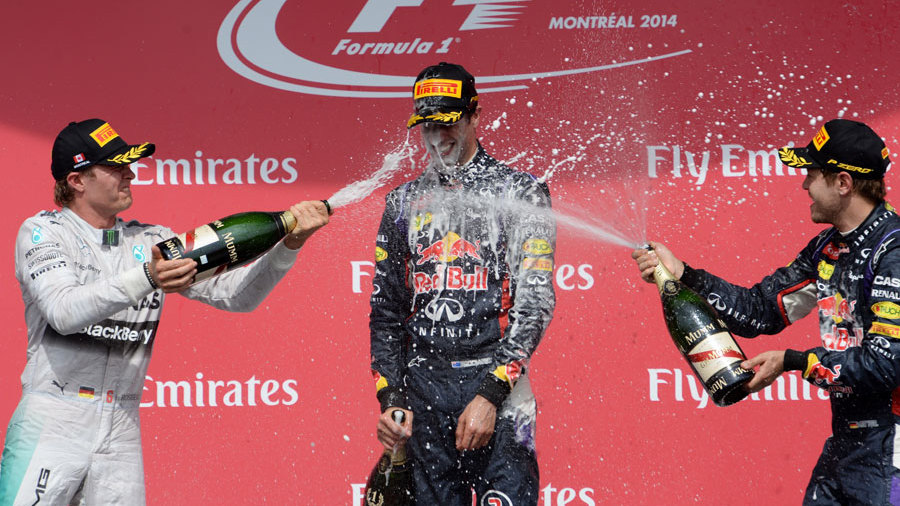- The Final Stint
Ricciardo welcomed to the winners' circle

- Race:
- Canadian Grand Prix
With Mercedes faltering in Canada, Red Bull took advantage while others lost their heads. ESPN's Final Stint looks back at the weekend's main talking points
Nice guys can finish first
Before an F1 car turned a wheel this weekend, Daniel Ricciardo told the press that he felt he should now be regarded as one of the top drivers on the grid. For many people that has never been in doubt, but by Sunday evening pretty much the whole paddock had accepted that Ricciardo is something rather special. His laid back personality and non-stop smiling lead you to think he may be lacking the raw determination and grit to be a champion, but so far this season he has outscored one of the grittiest opponents of all in team-mate Sebastian Vettel. His victory on Sunday came down to two crucial moments and he executed both perfectly. The first was ahead of his second pit stop when he produced a super-fast in-lap to get the jump on Sebastian Vettel who had the supposed advantage of pitting the lap before. Then his pass on Sergio Perez into Turn 1 required skill, judgement but most of all bravery as he skirted the limits of the track heading into Turn 2. If you're still not convinced then worry not, there is plenty more to come...
Mercedes meltdown
Although Ricciardo was a popular winner on Sunday, Nico Rosberg would have deserved equal adulation had he held on to victory in the final laps. The fact that a Mercedes with a MGU-K failure - significantly reducing power and putting more strain on the brakes - could still finish second at a track like Montreal tells you all you need to know about how dominant the W05 is this season. The problem itself caught the team by surprise when the control electronics for the MGU-K overheated and cut out the kinetic part of the energy recovery system on both cars. Lewis Hamilton's failure led to retirement after his brakes overheated at his second pit stop following a battering when they were asked to compensate for the lack deceleration from the MGU-K as it harvests power. The fact he was in the hot and turbulent air behind Rosberg for so many laps will not have helped, and further underlined the impact of the two mistakes he made on his qualifying lap on Saturday afternoon. Right now everything is falling Rosberg's way, but Hamilton will be happy in the knowledge that, without the issues, he was quicker all weekend.
Life outside F1
After weeks of speculation that Ferrari was attempting to lure Adrian Newey to Maranello with a combination of multiple zeros and cheques, the most sought-after designer in the paddock has committed his future to Red Bull - although possibly not in the manner the team would have hoped. Despite playing down the impact of Newey's decision to step back from his F1 role, Red Bull is going to have to learn to live without its lead designer over the coming years. It may come as a surprise to some, but had the paddock has been listening to the man himself then they would have seen it coming. As early as the first race Newey was questioning the logic of the new regulations and then made his feelings perfectly clear in Bahrain when pushed on the issue. At the time it was suggested that Newey was just towing the Red Bull party line after a tricky start to the season, but his concerns about making cars heavier with batteries that may not be as green as they seem are entirely genuine, not to mention extremely valid. Meanwhile, the rules have stripped the cars of downforce and limited the amount of time that can be spent in wind tunnels experimenting with new concepts. Newey has led many of the aerodynamic breakthroughs during a period in which aerodynamics have been king, so is it any wonder that he no longer sees F1 as a playground for his imagination?

The blame game
For all the thrills and spills Montreal throws up over a grand prix weekend, it can also produce some nasty accidents. Unfortunately Sunday was no exception as on the last lap Felipe Massa and Sergio Perez tangled, flinging both drivers at the barriers beyond Turn 1. Fortunately neither driver was hurt, but the question of blame has lingered on afterwards nevertheless. The stewards found Perez to blame for moving across on Massa under braking and penalised him five grid positions at the Austrian Grand Prix as a result. Perez believes Massa could have avoided the accident, arguing he had used the same line to defend against the Red Bulls on previous laps, which also explains why Ricciardo had to go the long way round when he passed the Force India at Turn 1.An even wider debate opened up when Williams engineer Rob Smedley said after the race that Force India should have retired Perez with the apparent brake issues on his car. Smedley's comments were based on radio traffic between Perez and the pit wall regarding the Force India's lack of brakes, which the Williams man argues is a good reason to retire a car or at least tell it to back off (as Williams did with Valtteri Bottas). However, whether the brake issue was as serious as first though is up for debate, with Force India believing Perez's initial concern was related to an electrical issue that was resolved before the accident. Ultimately it was a shame for both drivers, with Massa at the wheel of a Williams that had the pace to win the race in different circumstances and Perez failing to reap the rewards of a hugely impressive and well-planned one-stop strategy.

